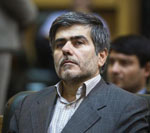 Reuters: Iran will press ahead with its uranium enrichment programme, its nuclear energy chief said on Friday, signalling no change of course despite the victory of a relative moderate in the June 14 presidential election. By Alissa de Carbonnel
Reuters: Iran will press ahead with its uranium enrichment programme, its nuclear energy chief said on Friday, signalling no change of course despite the victory of a relative moderate in the June 14 presidential election. By Alissa de Carbonnel
 ST PETERSBURG, Russia (Reuters) – Iran will press ahead with its uranium enrichment programme, its nuclear energy chief said on Friday, signalling no change of course despite the victory of a relative moderate in the June 14 presidential election.
ST PETERSBURG, Russia (Reuters) – Iran will press ahead with its uranium enrichment programme, its nuclear energy chief said on Friday, signalling no change of course despite the victory of a relative moderate in the June 14 presidential election.
Fereydoun Abbasi-Davani, head of the Islamic Republic’s Atomic Energy Organisation, said production of nuclear fuel would “continue in line with our declared goals. The enrichment linked to fuel production will also not change.”
Speaking through an interpreter to reporters at a nuclear energy conference in St Petersburg, Russia, he said work at Iran’s underground Fordow plant – which the West wants Iran to close – would also continue. Iran refines uranium at Fordow that is a relatively close technical step away from weapons-grade.
Iran says it is enriching uranium to fuel a planned network of nuclear energy power plants, and also for medical purposes.
But enriched uranium can also provide the fissile material for nuclear bombs if processed further, which the West fears may be Tehran’s ultimate goal.
Abbasi-Davani said Iran’s so far only nuclear power plant – which has suffered repeated delays – had been “brought back online” three days ago and was working at 1,000 megawatt capacity. A U.N. nuclear agency report said in May that the Russian-built Bushehr plant was shut down, giving no reason.
“Thankfully in the last days, no concrete defects with the plant have been reported to me,” Abbasi-Davani said.
Hopes for a resolution to the nuclear dispute were boosted this month with the election as president of Hassan Rouhani, who has promised a more conciliatory approach to foreign relations than confrontational predecessor Mahmoud Ahmadinejad. Rouhani will take office in early August.
NO FORDOW CLOSURE
As chief nuclear negotiator under a reformist president between 2003 and 2005, Rouhani struck a deal with European Union powers under which Iran temporarily suspended uranium enrichment activities. The work restarted after Ahmadinejad was first elected and has been sharply expanded.
Iran’s theocratic supreme leader, Ayatollah Ali Khamenei, said on Wednesday the nuclear stand-off could easily be resolved if the West were to stop being so stubborn.
The hardline Khamenei wields ultimate control over Iranian nuclear policy, although the president exerts some influence.
While accusing the West of being more interested in regime change than ending the dispute, Khamenei did express a desire to resolve an issue which has led to ever tighter and more damaging sanctions on Iran’s oil sector and the wider economy.
But analysts say it remains highly uncertain whether Iran may now be more prepared to meet the demands of world powers that it immediately halt its most sensitive enrichment, to a fissile concentration of 20 percent, and stop work at Fordow.
Asked whether there would be any change in Iranian policy after Rouhani’s election and whether it could suspend 20 percent enrichment, Abbasi-Davani said Iran’s nuclear programme was aimed at producing electricity and for medical purposes.
“In line with these two goals of course the production of energy will not stop,” he said.
Fordow is under the monitoring of the U.N.’s International Atomic Energy Agency, he said. “So in line with our declared plans … we will of course continue our work at this centre.”
Iran will soon hand over to the Vienna-based IAEA a list with plans for new nuclear reactor sites, he said, speaking in front of a model of the Bushehr reactor at the Islamic state’s stand at the nuclear industry fair in St Petersburg.
(Writing by Fredrik Dahl; editing by Mark Heinrich)


